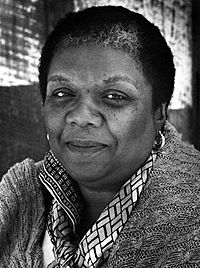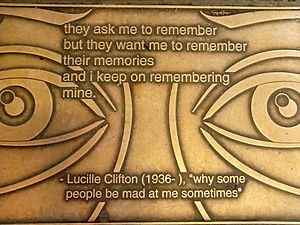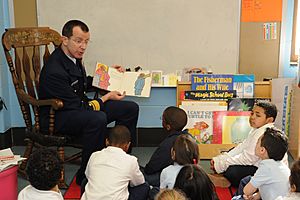Lucille Clifton facts for kids
Quick facts for kids
Lucille Clifton
|
|
|---|---|

Lucille Clifton
|
|
| Born |
Thelma Lucille Sayles
June 27, 1936 Depew, New York, US
|
| Died | February 13, 2010 (aged 73) Baltimore, Maryland, US
|
| Nationality | American |
| Occupation | Writer |
| Spouse(s) | Fred James Clifton (d. 1984) |
Lucille Clifton (born Thelma Lucille Sayles; June 27, 1936 – February 13, 2010) was an American poet, writer, and teacher. She was born in Depew, New York, and grew up in Buffalo. Lucille Clifton became famous for her powerful poems and popular children's books.
From 1979 to 1985, she was the Poet Laureate of Maryland, which means she was the official poet for the state. She was also a finalist for the important Pulitzer Prize for poetry two times.
Contents
Life and Early Career
Lucille Clifton went to Howard University on a scholarship from 1953 to 1955. Later, she studied at the State University of New York at Fredonia.
In 1958, Lucille Sayles married Fred James Clifton. He was a philosophy professor and a sculptor who created carvings of African faces. Lucille and Fred had six children together. She worked as a clerk in New York and later as a literature assistant in Washington, D.C.
A writer named Ishmael Reed helped Lucille meet her husband. Fred and Lucille Clifton even acted together in a play called The Glass Menagerie. People said their performance was "poetic and sensitive."
Becoming a Published Author
In 1966, Ishmael Reed showed some of Lucille Clifton's poems to the famous poet Langston Hughes. Hughes liked them so much that he included them in his book, The Poetry of the Negro. This was a big step for her writing career!
In 1967, the Cliftons moved to Baltimore, Maryland. Her very first book of poems, Good Times, came out in 1969. The New York Times newspaper even named it one of the ten best books of the year.
Lucille Clifton taught writing at several universities. She was a poet-in-residence at Coppin State College in Baltimore. She also taught at the University of California, Santa Cruz and Columbia University. In 1984, her husband, Fred, passed away from cancer.
In 2019, Lucille Clifton's daughter, Sidney Clifton, bought back the family's home near Baltimore. She plans to turn it into the Clifton House. This house will be a place to support young artists and writers. It will offer workshops, classes, and a gallery.
Lucille Clifton's Poetry

Lucille Clifton's family history was very important to her. She learned that her ancestors came from the West African Kingdom of Dahomey (now the Republic of Benin). Her mother always told her, "Be proud, you're from Dahomey women!"
A unique part of her family history was that girls were born with an extra finger on each hand. This is a genetic trait called polydactyly. When Lucille was a child, her two extra fingers were removed. She often wrote about these "two ghost fingers" in her poems.
Her poetry often explored her own body and feelings. For example, after a surgery, she wrote about her body feeling like "a home without a kitchen."
Children's Books
Lucille Clifton also wrote many popular children's books. Her series about a young Black boy named Everett Anderson began in 1970 with Some of the Days of Everett Anderson. Everett Anderson was a character who spoke in African American English. His stories helped children understand real-life social problems.
Her work is featured in many poetry collections. These include My Black Me: A Beginning Book of Black Poetry and Daughters of Africa.
Celebrating the Body: "homage to my hips"
In 1980, Lucille Clifton published a famous poem called "homage to my hips" in her book Two-Headed Woman. This book won an award and was known for its strong language and celebration of Black women.
The poem "homage to my hips" explores the relationship between African-American women and men. It aims to change negative ideas about the Black female body. Along with "homage to my hair," this poem connects the African-American body to powerful, almost magical, ideas.
Clifton used this poem to celebrate the African-American female body. She showed it as a source of power, pride, and freedom.
Awards and Recognition
Lucille Clifton received many awards for her writing. She won two Creative Writing Fellowships from the National Endowment for the Arts. She also received a grant from the Academy of American Poets.
Her children's book Everett Anderson's Good-bye won the 1984 Coretta Scott King Award. In 1988, she made history by becoming the first author to have two books of poetry chosen as finalists for the Pulitzer Prize in the same year.
She also won the 2000 National Book Award for Poetry for her collection Blessing the Boats: New and Collected Poems 1988–2000. From 1999 to 2005, she was on the Board of Chancellors for the Academy of American Poets. In 2007, she won the Ruth Lilly Poetry Prize, a very important award that honors a poet's lifetime achievements. She also received the Robert Frost Medal for her lifetime work in poetry.
Works
Poetry Collections
- Good Times, New York: Random House, 1969
- Good News About the Earth, New York: Random House, 1972
- An Ordinary Woman, New York: Random House, 1974
- Two-Headed Woman, University of Massachusetts Press, Amherst, 1980
- Good Woman: Poems and a Memoir: 1969–1980, Brockport: BOA Editions, 1987
- Next: New Poems, Brockport: BOA Editions, Ltd., 1987
- Ten Oxherding Pictures, Santa Cruz: Moving Parts Press, 1988
- Quilting: Poems 1987–1990, Brockport: BOA Editions, 1991, ISBN: 978-0-918526-81-6
- The Book of Light, Port Townsend: Copper Canyon Press, 1993
- The Terrible Stories, Brockport: BOA Editions, 1996
- Blessing The Boats: New and Collected Poems 1988–2000, Rochester: BOA Editions, 2000, ISBN: 978-1-880238-88-2
- Mercy, Rochester: BOA Editions, 2004, ISBN: 978-1-929918-55-3
- Voices, Rochester: BOA Editions, 2008, ISBN: 978-1-934414-12-5
- The Collected Poems of Lucille Clifton, Rochester, BOA Editions, 2012 ISBN: 978-1-934414-90-3
Children's Books
- Three Wishes (Doubleday)
- The Boy Who Didn't Believe In Spring (Penguin)
- The Times They Used To Be (Henry Holt & Co)
- All Us Come Cross the Water (Henry Holt)
- My Friend Jacob (Dutton)
- Amifika (Dutton)
- Sonora the Beautiful (Dutton)
- The Black B C's (Dutton)
- The Palm of My Heart: Poetry by African American Children. Introduction by Lucille Clifton (San Val)
The Everett Anderson Series
- Everett Anderson's Goodbye (Henry Holt)
- One of the Problems of Everett Anderson (Henry Holt)
- Everett Anderson's Friend (Henry Holt)
- Everett Anderson's Christmas Coming (Henry Holt)
- Everett Anderson's 1-2-3 (Henry Holt)
- Everett Anderson's Year (Henry Holt)
- Some of the Days of Everett Anderson (Henry Holt)
- Everett Anderson's Nine Month Long (Henry Holt)
Nonfiction
- Generations: A Memoir, Random House, New York, 1976, ISBN: 978-0-394-46155-7
See also
 In Spanish: Lucille Clifton para niños
In Spanish: Lucille Clifton para niños
 | Calvin Brent |
 | Walter T. Bailey |
 | Martha Cassell Thompson |
 | Alberta Jeannette Cassell |


